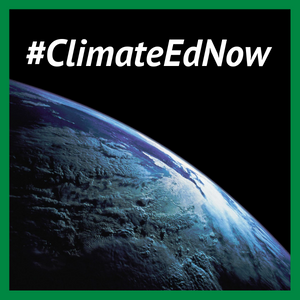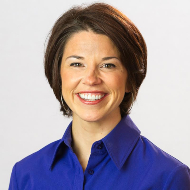According to a recent survey of 10,000 youth aged 16 to 25 across 10 countries, 84% were at least moderately worried about climate change. Nearly six in 10 young people were very or extremely worried. And one of the top negative emotions that young people reported? Fear. Overall, 67% of respondents reported feeling afraid about climate change, 57% in the U.S.
In other words, most young people are not feeling “prepared, not scared” about climate change.
Fear and anxiety about climate change is understandable. There’s no doubt that climate change is the biggest challenge of our time. But widespread fear and anxiety among young people is also a clear indicator that there is important work to be done, especially by educators.
Knowledge and education can chart our collective path from formidable challenges to much-needed solutions; from despair to engagement; from fear to hope. Just as forecasting an approaching storm can help people prepare and stay safe, educating young people about climate change can not only inform them about future risks, but also empower them in the pursuit of solutions.
The science is clear that the risks from climate change increase with every additional ton of heat-trapping pollution and every additional bit of warming. As temperatures continue to rise, climate change will affect more people, more industries, more cities, more food supplies, and more ecosystems. This means that we will need more climate-literate doctors, business leaders, urban planners, farmers, natural resource managers, and much more.
By making climate education integral to every student's school experience, educators can help prepare today’s children and adolescents to meet future challenges as informed and engaged adults.
Young people have already demonstrated that they’re ready for climate action, as evidenced by the remarkable growth of youth activism in recent years—from Greta Thunberg’s solo protest in Sweden to a growing global movement that has led the largest climate demonstrations in history. It’s virtually certain that children today will live in a warmer and riskier future. They shouldn’t have to face this future with only fear and anxiety, but rather as informed and empowered agents of change, entrepreneurs, and innovators that are equipped with the knowledge needed to live, lead, and even thrive in a warmer world.
The future belongs to the youth. And educators, just like meteorologists, can help equip young people with the knowledge needed to face this future prepared, not scared.
Read other essays from our #ClimateEdNow series.

 “Prepared, not scared.” This motto has guided my career as a TV meteorologist and climate science communicator. At its core, meteorology is about keeping the public safe from what’s coming—whether that’s tomorrow’s forecast or the increasing risks posed by climate change.
“Prepared, not scared.” This motto has guided my career as a TV meteorologist and climate science communicator. At its core, meteorology is about keeping the public safe from what’s coming—whether that’s tomorrow’s forecast or the increasing risks posed by climate change.